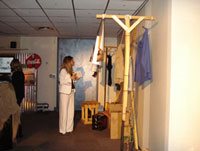The integration and segregation of the formal vs the informal economy is the subject of a key ethnographic study which used a narrative approach, called ‘Township Stories', commissioned by McCann Worldgroup SA. The aim was to provide a point of reference for brands when communicating with this diverse group of South Africans which usually tend to be lumped together as the homogeneous ‘mass market' by marketers.
One of the key findings was that brands need to be seen to be engaging with the communities that they are servicing – either through retail outlets or other commercial endeavours. Communities feel that money from new retail developments is flowing out of their areas and not necessarily benefiting the community directly.
This needs to change, the McCann research found.
The second key point was that the so-called mass market differs greatly within their communities and that marketers need to recognise and acknowledge these differences when communicating their brand messages.
Research findings
Townships are a marked South African phenomenon. People that reside in them are often seen as one indistinguishable mass with little consideration as to how lifestyles, areas, mindsets and perspectives differ, according to the McCann research statement. Many South Africans have very little interaction with townships. Their knowledge and understanding is often a guess or a perspective that sits somewhere along a spectrum of shacks to bricks, impoverished to vibrant, danger to mystery. It is a lack of exposure and information that leads to misinterpretation but as we slowly find a South African way of doing things, we are rediscovering the long-neglected places where so many of our people live, the McCann press statement continued.
Township Stories, an ethnographic study commissioned by McCann Worldgroup SA, had a core aim: to increase an understanding of the lives of South Africans living in these settlements, and in doing so provide a point of reference when communicating with this diverse, seemingly ‘one-dimensional' group of South Africans.
Township Stories is not a proprietary tool, and will be readily available to enterprises or any individual who has an interest in better understanding this subject. Martin Hummel, group chief executive, McCann WorldGroup SA, explains: “As there is little doubt that townships represent a substantial mass of the economic and social landscape of SA, and will undoubtedly play an increasing role in the markets of tomorrow, we were confident that an investment in understanding these markets would benefit our company, our clients and the industry as a whole.”
He continues, “While studies have been done that highlight aspects of these areas predominantly economic, there still remains a very real gap in understanding this market's day-to-day existence.”
Substance
There is no doubt that the group and the McCann strategic research unit involved feel very passionately about what they have undertaken. At the recent launch, the newly refurbished McCann reception area and boardrooms at their Sunninghill offices were decked out to resemble in part the three townships involved in the study, with photographs, diaries, artifacts and images from within each township, the team involved labeling what turned into a labour of love for them, as ‘marketing with meaning'.
Hummel explains that if marketers make a meaningful difference in people's lives in impoverished townships in particular, their brands will have more of an impact as they will be making a direct difference in the lives of entire communities.
McCann Erickson Strategy planning director, Alistair Duff was emphatic in explaining that a ‘mass approach' to marketing to the ‘mass market' was incorrect as people in different communities had different needs. “Companies that really care about their consumer will be involved in their communities in ‘mutually beneficial marketing' projects.”
Township Stories was undertaken to ease the hearsay and give real substance to the lives of those living in the townships; the hope and despair and the impact of investment and western culture. As a pilot project, the research focused on the lifestyle differences between three of Gauteng's biggest townships: Soweto, Alexandra and Orange Farm.
In using a compare and contrast methodology Township Stories seeks to highlight the differences between townships. “From the very inception of the research it is evident that the townships investigated are at very different stages of development, but equally evident is the different mindset that exists in each area,” comments Duff. “Varying dynamics give each township its own unique sense of personality and identity, and that's what we have explored and brought to life through this project.”
Soul
To capture what has been described as ‘the soul of these townships', individuals from these areas were filmed, photographed and interviewed. This personal approach assisted in penetrating the shroud of mystery that exists and the township differences serve as a foundation to many of the conclusions drawn in the report. Of equal importance are the evident similarities.
A key finding in each location was the reaction to the introduction of a more formal economy. Increasing investment in townships has facilitated an element of convenience to peoples' lives and the construction of malls is seen as a symbol of hope for continued progress.
The three townships share very similar concerns regarding both the impact and the intent of new developments. Many of those interviewed were cynical about where their money is going to at the end of the day. Pastor Mukpu, Soweto, says, “The people building the malls and those who won the shops are not from here, so they are just taking the money somewhere else.” The stereotypical "fat cat" leaving the township each day and heading back to the northern suburbs was a consistent theme.
The townships have seen very different levels of investment from the formal economy of South Africa:
Soweto has the greatest level of acceptance with many choosing new malls over the spaza stores that provided them with the basics. Range, value, convenience and hygiene are all seen as positive attributes of the new stores being built; with spaza usage being relegated to small necessities.
Alexandra, having less disposable income as a whole, does not mirror the levels of acceptance found in Soweto. The informal economy is often the sole means of existence for many of the residents. This includes those who set up stall every day hoping to make a few rand to feed themselves through to those who can only afford the lower prices of single items found at spazas etc. The informal trade is an entrenched aspect of life in Alex and as such the wholesale conversion to more formalised environments still seems quite distant.
Orange Farm has the least evidence of new formal economy entrants which proves a limitation in itself. Regardless of this the informal economy of Orange Farm is one of the cornerstones of the township's development. The strong sense of community extends to the small entrepreneurs who have been a part of the location's growth. More than mere purveyors of goods, the spaza stores and shebeens of Orange Farm are considered the foundation of community life. These are places where the residents meet and discuss their lives, gossip and offer or enlist assistance; it seems that no amount of money will replace the role that informal traders play in the everyday existence of Orange Farm.Community spirit
Despite differing degrees of comfort with this new formal economy, the three townships share very similar concerns regarding both the impact and the intent of new developments.
“It seems that the best way to relieve this issue would be to invest directly into the community in which new outlets are situated,” said Duff. “Initiatives tasked should include ensuring that jobs are given to the surrounding residents and that an active and perceivable involvement in community upliftment exists.”
Duff adds, “Through this brands and services will elevate themselves from convenient choices to loved and respected members of this current and future economy. This new realisation that tarred roads, well-lit streets, and safer neighbourhoods may serve as better brandbuilders than t-shirts and billboards will hopefully lead to a more relevant approach by South African marketers who recognise the potential to be found in these townships.”
McCann Worldgroup SA firmly believes that successful agencies should mirror the culture that surrounds them; for this reason Township Stories marks the beginning of an ongoing commitment to enhancing the understanding of the diverse and dynamic cultures of South Africa.
For more information regarding Township Stories or to secure a direct presentation at your company, Tamaryn Barnes, McCann Worldgroup, at: .









































